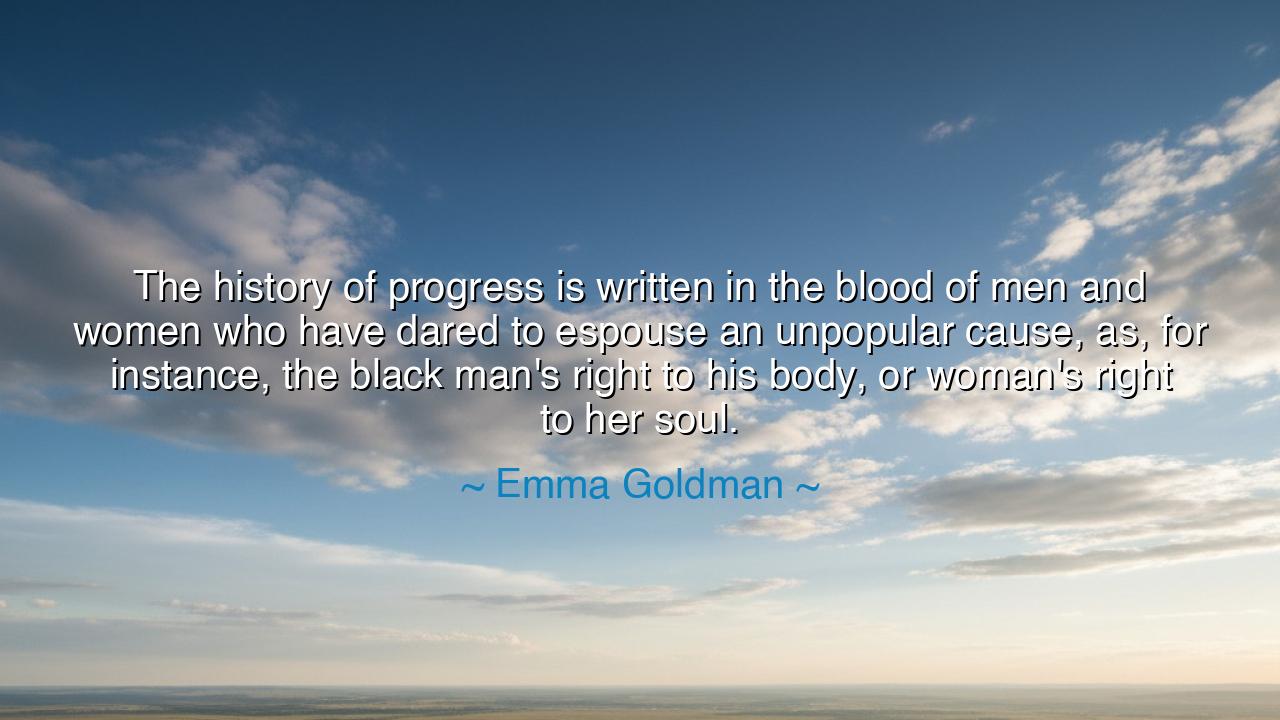
The history of progress is written in the blood of men and women
The history of progress is written in the blood of men and women who have dared to espouse an unpopular cause, as, for instance, the black man's right to his body, or woman's right to her soul.






“The history of progress is written in the blood of men and women who have dared to espouse an unpopular cause, as, for instance, the black man’s right to his body, or woman’s right to her soul.” So spoke Emma Goldman, the fiery spirit of freedom, who stood unafraid before the powers of her time. Her words are a torch passed down through the generations — blazing with the truth that every step forward in the long march of humanity has been paid for in suffering, courage, and sacrifice. To her, progress was no gentle unfolding of history, but a battlefield strewn with the lives of those who dared to challenge the chains of their age. She reminds us that every right we hold dear today was once a heresy, every liberty once branded rebellion.
In these words, Emma Goldman — anarchist, thinker, and advocate for the oppressed — spoke from the crucible of struggle. Born into a world that silenced women and crushed dissent, she learned early that freedom is never granted willingly by those who hold power; it must be seized by those who refuse to bow. Her cry that the “history of progress is written in blood” is not an appeal to violence, but an acknowledgment of reality: that the cost of truth has always been paid in the flesh and spirit of the brave. Those who dared to speak before their time — who claimed ownership over their own bodies, minds, and destinies — were ridiculed, beaten, imprisoned, or slain. Yet their courage carved new paths through the wilderness of ignorance, and upon their pain was built the edifice of our modern conscience.
When Goldman speaks of “the black man’s right to his body,” she invokes the most primal struggle of all — the struggle for ownership of the self. The story of slavery, of centuries of stolen labor and broken humanity, stands as one of the darkest shadows upon the world’s soul. Men and women like Frederick Douglass, who rose from bondage to voice the thunder of liberty, and Harriet Tubman, who led her people through the midnight of oppression toward the dawn of freedom, bled so that others might live as whole human beings. Their bodies bore the marks of whips, yet their spirits were unbroken — for they believed that freedom is the birthright of every soul, and that no law or empire can command ownership over a human being’s flesh.
When she speaks of “woman’s right to her soul,” Goldman points to another ancient battle — the war for the recognition of woman as a complete and independent being. For millennia, women were treated not as souls but as property, confined to silence and obedience. Yet from that silence rose voices like Mary Wollstonecraft, Susan B. Anthony, and Elizabeth Cady Stanton, who declared that the spirit of woman was not made to serve, but to soar. And Emma Goldman herself, with unyielding fire, demanded more than the right to vote — she demanded the right to think freely, to love freely, to live authentically. She saw that the freedom of the body is incomplete without the freedom of the soul, and that both must be claimed through struggle.
But Goldman’s wisdom does not rest solely in the recounting of past battles. Her words are a warning to every generation: that progress is never secure. The blood that purchased yesterday’s victories must not be forgotten, for history has a cruel habit of repetition when memory fades. Those who benefit from freedom must never grow complacent, lest the chains reforged in new forms bind again the minds and bodies of the people. Every age produces new “unpopular causes” — truths that unsettle the comfortable and challenge the order of things. And it is in the defense of these new truths that the spirit of the old heroes lives on.
Consider, for example, the fight for civil rights in the twentieth century, when millions marched beneath banners of peace and justice, facing hatred, prisons, and death. The world watched as Martin Luther King Jr. stood in the shadow of bullets and fire hoses, preaching love against cruelty, equality against fear. His blood, too, became part of that same story — the history of progress written, as Goldman said, in sacrifice. And yet, from his martyrdom bloomed new movements, new voices, new awakenings. So it has ever been: from pain, freedom; from struggle, enlightenment.
So, my child of tomorrow, when you see injustice rising, do not turn your face away. When you hear the cries of those whose causes are mocked or silenced, remember Emma Goldman’s words. The path of truth is never paved with comfort, and those who walk it must sometimes bleed. But it is through their wounds that humanity breathes and grows. Take courage, then — not in the hope that your struggle will be easy, but in the faith that it will be meaningful. For every act of defiance in the name of truth, every word spoken against cruelty, becomes another line written in the eternal story of progress — a story inscribed not in ink, but in the blood and brilliance of the human soul.






AAdministratorAdministrator
Welcome, honored guests. Please leave a comment, we will respond soon